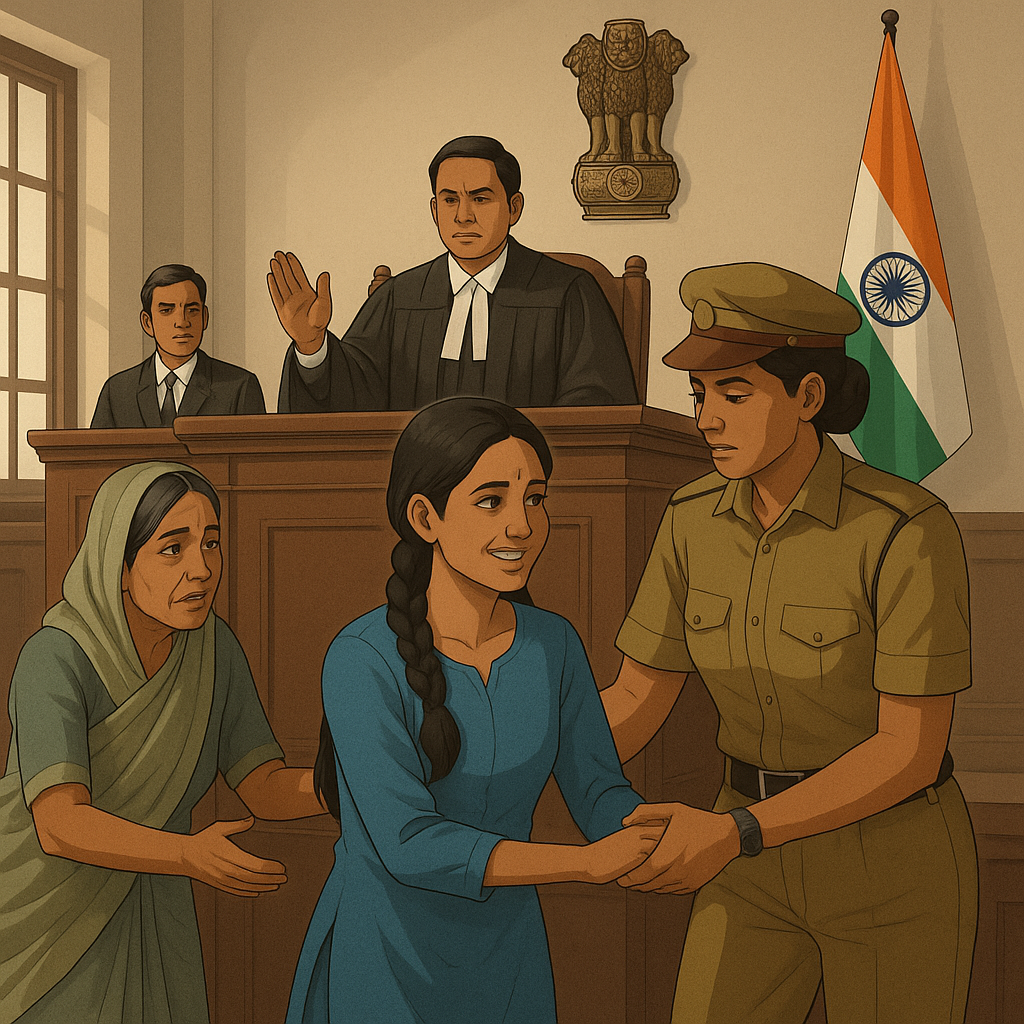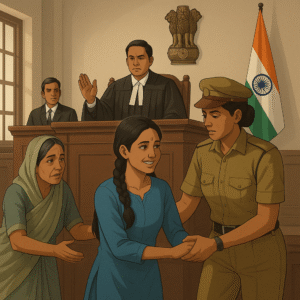Simplified Explanation of the Judgment
In a compassionate and rights-based decision delivered on 25 March 2021, the Patna High Court directed the immediate release of a young woman who had been kept in a Remand (Observation) Home for over a year, despite having attained majority.
The Court, presided over by Hon’ble Mr. Justice Rajeev Ranjan Prasad, strongly criticized the handling of the case by the Magistrate, emphasizing the need for judicial sensitivity while dealing with victims and young women under the Juvenile Justice (Care and Protection of Children) Act, 2015.
The Court also requested the Chief Justice of Patna High Court to ensure that all judicial officers in Bihar undergo training and sensitization sessions through the Bihar Judicial Academy on how to handle similar cases involving minor or young adult victims.
Background of the Case
The case arose from an FIR registered as Barh P.S. Case No. 57 of 2020 under Sections 363 and 366(A) of the Indian Penal Code, filed by the father of a girl who claimed that his daughter had been taken away by a young man on a motorcycle.
The police later recovered the girl and presented her before the Judicial Magistrate, Barh, for recording her statement under Section 164 Cr.P.C.
In her statement, the girl clearly said:
- She had left her house on her own, as her parents wanted to marry her against her will.
- She did not wish to live with her parents.
- She wanted to live with her maternal grandmother instead.
Despite this, the Additional Chief Judicial Magistrate (ACJM), Barh, assessed her age as 17 years — although she herself stated she was 18 and a Class XII student — and ordered that she be kept in the Observation Home at Gaighat, Patna City.
Since March 2020, the girl remained confined there, prompting her to file a Criminal Writ Petition (Cr.WJC No. 408 of 2021) before the Patna High Court seeking her release.
Arguments of the Petitioner (Victim Girl)
Her counsel, Mr. Upendra Kumar Singh, argued that:
- The learned Magistrate had acted mechanically and failed to verify her school certificate before concluding that she was a minor.
- The Magistrate ignored her explicit wish to stay with her grandmother, which would have been more humane and lawful.
- There was no objection from her parents to her staying with her grandmother.
- Keeping her in an institutional home violated her fundamental rights under Article 21 (Right to Life and Liberty).
State’s Response
The State’s counsel, Mr. Sheo Shankar Prasad, APP, and the counsel for the informant (the father) both agreed that:
- The petitioner had already attained majority.
- There was no reason to detain her further in the remand home.
- If she did not wish to live with her parents, she could live with her maternal grandmother.
Court’s Observations
The High Court made several important findings that go beyond this individual case:
- Failure to Verify Age
The Magistrate should have verified the girl’s school certificate before concluding that she was 17. The record itself mentioned that she was a Class XII student. - Ignoring the Girl’s Wishes
The Magistrate’s order failed to discuss or consider her desire to stay with her grandmother. No reason was given for rejecting that request. - Judicial Sensitivity under Parens Patriae Principle
The Court emphasized that judges must act as guardians (parens patriae) when dealing with minors or victims, considering the emotional, social, and personal well-being of the child before ordering institutional care. - Institutional Care as a Last Resort
A child or victim should only be sent to an Observation Home when it is absolutely not possible to keep them with family or trusted guardians. - Freedom of Major Girls
Referring to Shafin Jahan v. Asokan K.M., AIR 2018 SC 1933, the Court reiterated that once a girl attains majority, she is a free citizen and entitled to choose her own residence and life partner, without interference from parents or police. - Need for Judicial Training
The Court directed that judicial officers must be sensitized about the legal and emotional aspects of such cases through the Bihar Judicial Academy.
Final Decision
The Patna High Court:
- Set aside the order dated 20.03.2020 passed by the ACJM, Barh.
- Directed the Superintendent of the Girl’s Remand Home, Gaighat, to immediately release the petitioner.
- Allowed her to choose her place of residence, including her grandmother’s home.
- Directed that her medical report (from November 2020) be handed over to her at the time of release.
- Instructed her father not to use any pressure or force to bring her back.
- Requested the Chief Justice to ensure judicial sensitization classes through the Bihar Judicial Academy.
Significance or Implication of the Judgment
This judgment marks an important reaffirmation of the rights of adult women and young girls under Indian law. Its implications are broad and practical:
- It establishes that Magistrates must carefully assess age and family alternatives before ordering institutional custody.
- It protects the liberty and dignity of women by recognizing their right to make personal choices once they are majors.
- It reinforces that institutionalization must be a last resort, not a default option.
- It pushes for training and accountability within the lower judiciary, ensuring better handling of sensitive cases involving minors.
- The judgment also highlights the role of family-based rehabilitation over mechanical institutional care, aligning with the spirit of the Juvenile Justice Act, 2015.
Legal Issue(s) Decided and the Court’s Decision
- Issue 1: Whether the Magistrate erred in determining the girl’s age and sending her to an observation home.
➤ Decision: Yes. The Magistrate acted without verifying her school records. - Issue 2: Whether a girl who has attained majority can be detained in an observation home.
➤ Decision: No. A major woman is entitled to freedom of choice and cannot be kept in institutional custody. - Issue 3: Whether courts should prioritize family-based care over institutionalization.
➤ Decision: Yes. Institutional care is only justified if no safe family or guardian environment exists.
Judgments Relied Upon or Cited by the Court
- Shafin Jahan v. Asokan K.M., AIR 2018 SC 1933
- Based on the News Item uploaded on the website of News App Bar & Bench v. State of Bihar, 2018 SCC OnLine Pat 1179
Case Title
Khushi Kumari v. The State of Bihar & Ors.
Case Number
Criminal Writ Jurisdiction Case No. 408 of 2021
Citation(s)
2021(2) PLJR 862
Coram and Names of Judges
Hon’ble Mr. Justice Rajeev Ranjan Prasad
Names of Advocates and Who They Appeared For
Mr. Upendra Kumar Singh — for the petitioner
Mr. Sheo Shankar Prasad, APP — for the State
Link to Judgment
MTYjNDA4IzIwMjEjMyNO-p8s2jbFalS0=
If you found this explanation helpful and wish to stay informed about how legal developments may affect your rights in Bihar, you may consider following Samvida Law Associates for more updates.








